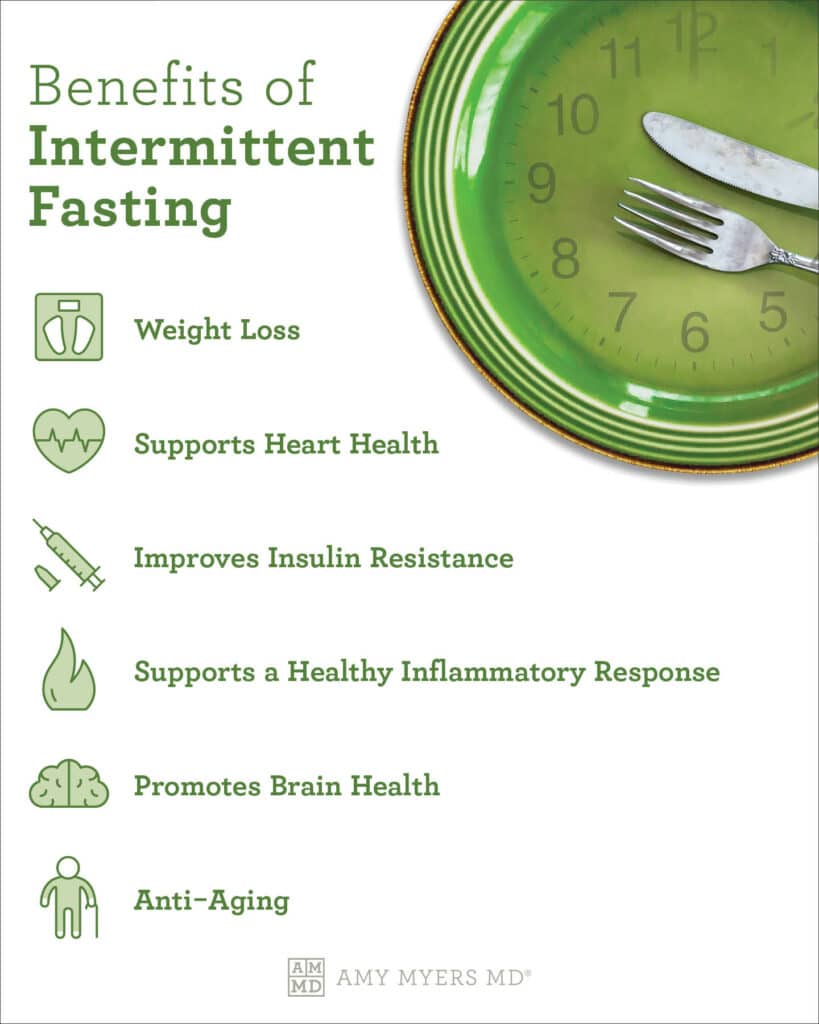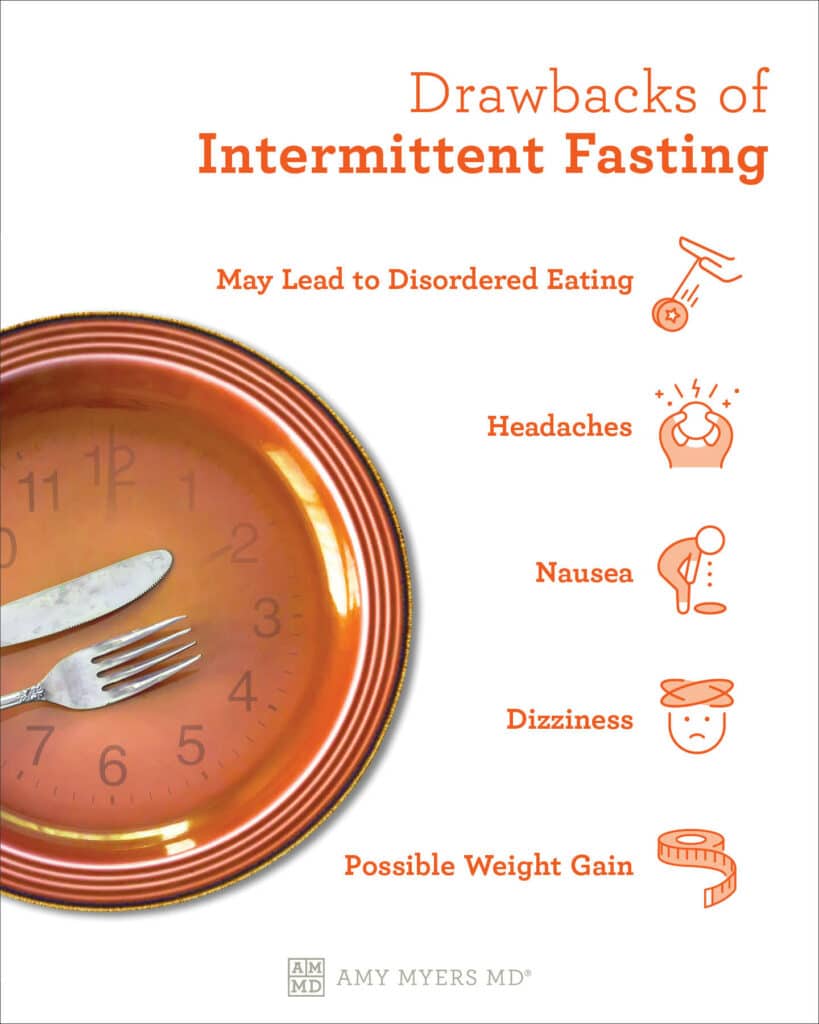One question I get asked all the time is, “what are the pros and cons of intermittent fasting?” You’ve likely seen articles about intermittent fasting or known someone that has tried it. It’s been all the craze in the wellness world for a couple of years. Yet, is it really good for your body?
While this style of eating is trendy, it’s not new. People fast for various reasons, including for religious rituals. Our hunter-gatherer ancestors went through periods of feast and famine as a part of life because they didn’t have access to an abundance of food we have today.
There are both pros and cons of intermittent fasting, and I’m going to tell you about both. For some people intermittent fasting can do more harm than good. For others, it’s a way to reset your digestive system, lose weight, or reduce the risk of developing diabetes, insulin resistance, and even balance hormones.1 Before I discuss the pros and cons of intermittent fasting, let’s go over what exactly is intermittent fasting.
What is Intermittent Fasting?
Intermittent fasting is an eating pattern that cycles through set periods of eating and fasting. While most diets focus on what to eat, intermittent fasting highlights when to eat.
There are many different versions of intermittent fasting, however all revolve around sticking to specific eating and fasting schedules. For example, one popular fasting pattern advises eating all meals within an 8-hour window. Another intermittent fasting method entails fasting for 24 hours once or twice a week.
How Intermittent Fasting Works
Your body breaks down carbohydrates into glucose to provide it energy. When your body doesn’t get enough carbohydrates or calories for energy, it begins utilizing fat cells to turn into glucose for energy. Intermittent fasting triggers your body to burn stored fat for fuel since it’s not getting carbohydrates from food. This is known as “flipping the metabolic switch.”2
As stored fat is broke down, your body produces ‘ketones,’ also known as ketone bodies. Ketones serve as an alternative fuel source when glucose is in short supply.3
This elevation of ketones in the body is known as ‘ketosis’ and is the goal of the ketogenic diet. However, other practices such as fasting can induce ketosis as well.
If you’re eating three meals a day, snacking frequently, and not exercising, your body always has a steady stream of glucose. Intermittent fasting extends the periods that your body has burned through the calories of your last meal. Research shows this gives your body more fat-burning potential and may protect against chronic diseases such as diabetes, cancer, heart disease, and obesity.4
While there are many benefits to intermittent fasting, it’s not for everyone. People with certain health conditions will need to be cautious. I’ll explain this further in an upcoming section.
Methods of Intermittent Fasting
There are basically three methods of practicing intermittent fasting. I recommend talking with your functional medicine doctor about intermittent fasting to determine if it’s right for you. Here are three of the most popular ways to do intermittent fasting:
The 16/8 Method
This method entails maintaining an 8-hour eating window and a 16-hour fasting window. For example, you might eat dinner at 6 pm and breakfast at 10 am. Since you’re sleeping during a good chunk of your fasting window, 16/8 is a more beginner friendly option than other fasting methods.
The 5:2 Approach
This approach involves eating normally for five days of the week and restricting calories for two days. Fasting days are limited to 500 to 600 calories and should never be back-to-back. For example, you might choose Tuesdays and Fridays as your fasting days.
Eat-Stop-Eat Method
Created by author Brad Pilon, this method involves doing a 24-hour fast once or twice a week. While this may sound extreme, you do eat something every day. For example, you enjoy your Wednesday dinner and then don’t eat again until dinnertime on Thursday. Similar to the 5:2 approach, if you decide to do two fasting days a week, always make sure they’re nonconsecutive days.
What are the Pros and Cons of Intermittent Fasting?
If you try intermittent fasting, it is important to focus on eating foods that nourish your body such as grass-fed meats, leafy greens, and organic fruits and vegetables regardless of what method. Something to keep in mind is that eating processed foods during the eating periods will keep you from getting the benefits of intermittent fasting. As with any diet, there’s good and bad that come with each. Let’s discuss the pros and cons of intermittent fasting.
 Dr. Amy Myers
February 16th, 2022
https://content.amymyersmd.com/article/intermittent-fasting-pros-and-cons/Pros and Cons of Intermittent Fasting – infographic – Dr. Amy Myers MD®
Dr. Amy Myers
February 16th, 2022
https://content.amymyersmd.com/article/intermittent-fasting-pros-and-cons/Pros and Cons of Intermittent Fasting – infographic – Dr. Amy Myers MD®The Pros of Intermittent Fasting
Numerous studies show that intermittent fasting offers a wide range of health benefits, including:
It Can Help You Lose Weight
As stated before, fasting fosters ketogenesis, allowing your body to burn stored fat for fuel instead of glucose. Intermittent fasting increases your Human Growth Hormone (HGH), which is linked with fat loss and muscle gain. In fact, in one alternate day fasting study, patients lost an average of 8% of their body fat in just eight weeks!5
It Reduces Insulin Resistance
Research shows intermittent fasting can lower insulin levels and even improve insulin sensitivity in people who are prediabetic.6
One study that used patients with type 2 diabetes as subjects found that fasting increased weight loss and significantly lowered blood sugar levels. 7
It Can Reduce Inflammation
Chronic inflammation is at the root of nearly every modern illness, including diabetes, obesity, heart disease, Alzheimer’s, autoimmune disease, and cancer.8
However, there’s good news! Studies show fasting lowers levels of systemic inflammation and pro-inflammatory cytokines.9
It also reduces oxidative stress, helping your body combat harmful free radicals.
It Can Lower the Risk of Heart Disease
Studies reveal intermittent fasting can lower numerous risk factors linked to heart disease. For example, in one study, intermittent fasting reduced body weight, body fat, LDL cholesterol, triglycerides, and blood pressure. Fasting also increases levels of adiponectin, a hormone with powerful cardioprotective properties.
It Supports Brain Health
Fasting doesn’t just benefit your heart; it helps your brain too! Studies show intermittent fasting increases levels of brain-derived neurotrophic factor (BDNF) and may even aid in the growth of new neurons! Low BDNF is linked with depression as well as cognitive impairment and decline. While additional research is needed, fasting’s anti-inflammatory effects may protect against Alzheimer’s and other neurodegenerative diseases.
It is Anti-Aging
Intermittent fasting causes changes in gene expression that support longevity and reduces the risk of chronic illness. How? Fasting induces autophagy, your body’s internal housekeeping system. During autophagy, your body cleans out aging or damaged cells and recycles parts to be used for cellular repair.
It Promotes Longevity
Increased autophagy may delay aging and promote longevity. In fact, in one animal study, rats that fasted lived up to 83% longer!
 Dr. Amy Myers
February 16th, 2022
https://content.amymyersmd.com/article/intermittent-fasting-pros-and-cons/Pros and Cons of Intermittent Fasting – infographic – Dr. Amy Myers MD®
Dr. Amy Myers
February 16th, 2022
https://content.amymyersmd.com/article/intermittent-fasting-pros-and-cons/Pros and Cons of Intermittent Fasting – infographic – Dr. Amy Myers MD®The Cons of Intermittent Fasting
While the pros of intermittent fasting are robust, there are also several downsides. Here are the cons of intermittent fasting that you should consider before starting it.
You Can Still Gain Weight
Typically, intermittent fasting reduces your overall caloric intake. This is a massive key in intermittent fasting’s weight loss success. Many people get burnt out with yo-yo dieting and turn to fasting to lose weight without the hassle of counting calories. If you overindulge during your eating window, you can still gain weight. Intermittent fasting is not a free pass to eat piles of fast food and other junk when not fasting. For optimal results, choose nutrient-dense foods such as organic fruits and veggies, grass-fed meat, wild fish, and healthy fats for fuel.
There are Side Effects
Some people may experience side effects from intermittent fasting. This is especially the case when starting intermittent fasting for the first time. Some people may experience what’s known as a ‘fasting headache’ as their body adjusts to caloric restriction. Other potential side effects include: fatigue, dizziness, digestive issues (including nausea, diarrhea, constipation, & bloating), irritability, sleep disturbances, dehydration, and malnutrition.
It Can Influence Disordered Eating
The restrictive nature of intermittent fasting may trigger unhealthy eating patterns in some people. For example, intermittent fasting may lead to binging behaviors when not fasting. This is especially true for people with a history of eating disorders. If you’re someone who struggles with disordered eating, fasting could do more harm than good.
Intermittent Fasting Safety
Although intermittent fasting does have a variety of impressive health benefits, it’s not for everyone. Talk with your medical doctor before beginning intermittent fasting if you have any of the following conditions:
- Diabetes or trouble regulating blood glucose levels: Patients with diabetes need to eat regularly to maintain proper blood sugar balance. If you have diabetes, intermittent fasting could cause your blood sugar to get dangerously low.
- Low blood pressure: Studies show intermittent fasting can lower your blood pressure. So, it may be risky for people who already have low blood pressure.
- Take certain medications: Exercise caution if you take diabetes, blood pressure, or thyroid medications. Fasting will affect their absorption. In addition, many medications are intended to be taken daily with meals. Taking these when fasting may alter absorption and increase adverse side effects.
- Are underweight: If you’re underweight, you’ll need sufficient steady calories to maintain your energy levels. Not sure whether you’re underweight? Try this handy BMI calculator to find out.
- History of eating disorders: We’ve already touched on this, yet it bears repeating. Please refrain from fasting if you have a history of disordered eating. Intermittent fasting may trigger unhealthy eating patterns such as binging.
- Trying to conceive children: There is evidence that intermittent fasting may impact fertility and cause changes in menstruation. So, hold off on fasting if you’re trying to get pregnant.
- Are pregnant or breastfeeding: It’s challenging to get the nutrition needed for you and your baby during limited eating windows. Growing a human (or feeding one) requires a lot of energy! Limiting your nutrition through fasting could hinder your baby’s development.
What to Consider Before Trying Intermittent Fasting
There are pros and cons of intermittent fasting, however there are other risks involved. As I’ve stated before, you should talk to your doctor before beginning intermittent fasting. Whether or not fasting is right for you depends on several factors. Here is what you should consider before trying intermittent fasting.
It’s Not for Everyone
Fasting diets could exacerbate symptoms of hormonal imbalance, thyroid conditions, and adrenal fatigue. These effects are more pronounced for women, as their bodies are more sensitive to energy restriction than men. In some studies, fasting resulted in irregular menstrual cycles.
Hunger hormones and sleep patterns can also be disrupted by energy restriction. Fasting induces ketosis, which can strain your adrenal glands. Your adrenal glands produce the stress hormone cortisol, which helps maintain healthy blood sugar levels. If you’re experiencing adrenal fatigue, you’ll already be struggling with cortisol production and blood sugar balance. Talk to your functional medicine physician if you have a health condition that could be affected by fasting.
Start Slow
If you’re new to intermittent fasting, slowly ease into it. Begin with larger eating windows, such as 12 hours. Then, listen to your body and gradually work your way to smaller eating windows to find the best fit for you.
Spontaneous meal skipping can also be an easy intro to the world of fasting. Simply skip meals when you’re not hungry or too busy to cook. Ditching late-night snacks are also a simple way to slowly acclimate your body to larger fasting windows. Easy does it.
Provide Your Body with the Nutrients it Needs
Giving your body the right vitamins and nutrients is critical for optimal health, especially when you’re following a fasting program. Eat plenty of nutrient-dense organic fruits and vegetables, grass-fed meat, wild fish, and healthy fats during your eating window. This will give you the nourishment needed to sustain your energy levels throughout your fasting period.
Adding a high-quality multivitamin such as the Myers Way® Multivitamin can help fill in the gaps not met by diet alone. I recommend taking it with the first meal of the day to ensure optimal absorption. Soil depletion, chronic digestive issues, and stress all impact our ability to meet our nutritional needs. Intermittent fasting can make it even more challenging to get all the vitamins, minerals, and nutrients needed during your fasting window.
That’s why it’s essential to supplement your diet with a potent, bioavailable multivitamin to meet your body’s needs. I custom formulated The Myers Way® Multivitamin to build a foundation for optimal health. It contains the ideal blend of methylated B vitamins, chelated minerals, vitamin D, and antioxidants to give you the full spectrum of nutrients your body needs.
Intermittent fasting can be a helpful tool for weight loss, reducing inflammation, and reducing your risk of chronic illness. There are pros and cons to intermittent fasting, however, it does have its risks. Always talk with your doctor before implementing a fasting diet. If they give you the okay, then be sure to start small and support your body with the right nutrients to enhance your fasting success.

Article Sources
- 10 Evidence-Based Health Benefits of Intermittent Fasting. Kris Gunnars, BSc. Healthline. 2021.
- Flipping the Metabolic Switch: Understanding and Applying Health Benefits of Fasting. Stephen D. Anton, et al. Obesity (Silver Spring, Md) vol 26. 2018.
- What Is Ketosis, and Is It Healthy?. Grant Tinsley, PhD. Healthline. 2019.
- Fasting: Molecular Mechanisms and Clinical Applications. Valter D Longo and Mark P Patterson. Cell metabolism vol 19. 2013.
- Alternate day calorie restriction improves clinical findings and reduces markers of oxidative stress and inflammation in overweight adults with moderate asthma. James B Johnson, et al. Free Radial Biology & Medicine vol 42. 2006.
- Alternate-day fasting in nonobese subjects: effects on body weight, body composition, and energy metabolism. Leonie K Heilbronn, et al. American Journal of Clinical Nutrition. 2005.
- Effects of intermittent fasting on health markers in those with type 2 diabetes: A pilot study. Elizabeth F Sutton, Phd, et al. World Journal of Diabetes. 2017.
- Chronic inflammation in the etiology of disease across the life span. David Furman, et al. Nature Medicine. 2019.
- Dietary Intake Regulates the Circulating Inflammatory Monocyte Pool. Stefan Jordan. Cell Magazine, vol 178. 2019.
